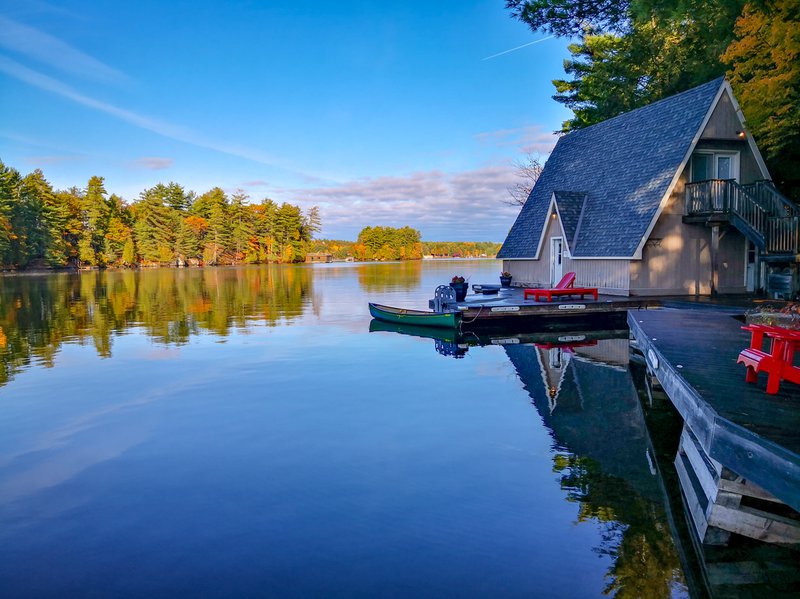
TIM CESTNICK
May 29, 2020
Jo and Lonnie Harrison of Houston enjoy making trips to their vacation cabin in Madisonville, Tex. On Feb. 2, 2018, Lonnie made the 1½ hour drive from their home to the property to check up on the place since they hadn’t been there for two months. When he arrived, the cottage was gone. “All I saw was pipes and blocks," he told KTRK-TV. It turns out that the prefab cabin, which in fact hadn’t been paid off by the previous owner, was repossessed.
There may come a day when your own cottage, or cabin, changes hands. Let’s hope it’s because you’ve done some good planning, and perhaps that special retreat will end up in the hands of your children. Today, I want to talk about three common ways to pass the cottage to your heirs.

THE BASICS
Once you’re certain that one or more of the kids want to own the cottage, and that they have the ability and desire to own and even share it (see my articles from May 15 and May 22), you’ll need to decide whether you’ll transfer ownership during your lifetime, or when you pass away. Most people wait until they’re gone to leave the vacation property to the kids, but some prefer to see the kids own, enjoy and share it while they’re still around, to make sure things are going smoothly. If you transfer the property during your lifetime, you can arrive at a simple agreement that gives you a right to use the property during your lifetime.
Keep in mind, as soon as you transfer ownership, regardless of whether it’s a gift or sale, you’ll be deemed to have sold the property at fair market value, which means there could be a tax hit if the property has increased in value (more on this in a minute). There are three common options for transferring the cottage.
THE OPTIONS
- Make a gift. Gifting the cottage to the kids during your lifetime will be treated like a sale at fair market value. And if you gift the cottage to your kids (or anyone other than your spouse) in your will upon your passing, you’ll similarly be deemed to have disposed of the cottage at fair market value at the time of your death. So, either way, a gift will trigger any accrued capital gains. Your first line of defence against the taxman is to shelter the transfer from tax using your principal residence exemption (PRE; most cottages will qualify as a principal residence). The only issue is that you might prefer to save the exemption for your city home if it has the larger capital gain per year of ownership. If you do make a gift today, you’ll generally lose control of the cottage but could still retain certain rights by a written agreement with the kids. Get legal advice here.
- Sell it to your heirs. Selling to the kids can work well if you need the cash and they have the means to pay you. As with a gift, you’ll face tax on any capital gain but can generally shelter that gain from tax using your PRE. Beware of a common pitfall: If you sell the cottage to the kids for less than fair market value, you’ll be deemed to have sold it for fair market value anyway. Further, your kids’ adjusted cost base will be that low sales price they actually pay. The problem? This causes double taxation (once in your hands and once in your kids’ hands) on the value between your low sales price and the true fair market value. A better solution is to sell the cottage to the kids for fair market value and take back a promissory note for part of the sales price if you don’t intend for them to pay you full value in cash today. Then, you can forgive the note on death with no adverse tax consequences.
- Use a family trust. Holding the cottage in a trust can allow you to control and use the cottage even while it’s not owned by you directly, and can shelter the cottage from creditors and probate fees. You’ll be deemed to have sold the cottage at fair market value when transferring it to the trust, but you may be able shelter any gain using the PRE. Be aware that, every 21 years, the trust will be deemed to have sold its assets at fair market value, which could create a tax hit at that time. There are ways to deal with this issue; speak to a tax pro about it. Finally, the trust is not eligible for the PRE itself, so a sale later could trigger a tax bill; advice from a tax pro will be important at that time. The cottage can be distributed from the trust to the kids (beneficiaries) at a later date, or simply kept in the trust as a common vehicle to own the cottage for their benefit.
This Globe and Mail article was legally licensed by AdvisorStream.
© Copyright 2024 The Globe and Mail Inc. All rights reserved.


